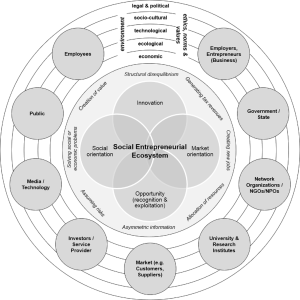61
Michael Wirtz and Christine Volkmann, University of Wuppertal, Germany
Introduction
Urbanization, one of the megatrends of the 21st century, has made it increasingly important for cities to find innovative solutions to the problems they face. The creation of a social entrepreneurial ecosystem within a growing city poses one way of strengthening and bundling all social forces, committing them to foster sustainable urban development. Nowadays, two labels exist within this context. In 2010, the possibility of declaring a city a Social Business City came into existence. Additionally, with regards to the UK, a city can also be announced a Social Enterprise City since 2013. Finally, both cases entail the creation of a supportive network of local institutions and entrepreneurs in order to mould a path for social entrepreneurs to succeed in their mission.
Social Entrepreneurship and Social Business
Although much research has been done on the concept of social entrepreneurship, no consensus has been found on an official definition of the term. Nevertheless, many definitions include the aspect of applying entrepreneurial means to solve social problems in an innovative way. Whilst a social entrepreneur is, at times, permitted to retain at least a part of the profits made by a business, a social business entrepreneur is not. Social business, a term developed by Grameen Bank founder Muhammad Yunus, entails that all surpluses generated are reinvested in order to pursue the business’ social mission. The professor of economics was awarded the Nobel Peace Prize in 2006 for providing micro-loans to the rural poor in Bangladesh. Yunus can be named a serial social entrepreneur since he founded about more than 50 companies around the world so far. The concept of social business differentiates from social entrepreneurship in two ways: apart from the fact that all surpluses are reinvested in the business in order to pursue their social mission, social business investors only get back the initial amount they invested, even after years:
“In social business, a dollar is a dollar is a dollar. If you invest a thousand dollars in a social business, you’ll get back a thousand dollars – not a penny more” (Yunus, 2010, p. 2)
Social Business City
So far, three cities have declared themselves a Social Business City. Wiesbaden in Germany was the first in 2010, followed by Fukuoka (Japan) in 2011 and Pistoia (Italy) in 2012. The idea was developed by Yunus and his partner Reitz who had founded the Grameen Creative Lab, based in Wiesbaden, Germany, in order to spread the idea of social business by for example organizing events all over the world. Wirtz and Volkmann (in press) conducted semi-structured interviews with the representatives of the abovementioned cities in order to discover the processes and dynamics involved in building a Social Business City. For this, there should be support by local institutions, entrepreneurs, and a coordinating organisation responsible for the emergence of a local network. Additionally, a resolution by the municipal council, leading to a treaty signed both by the mayor and Yunus, is required.
The interviewees expressed that awareness creation of the social business concept is still very important and some social businesses have been founded within these cities.
Social Enterprise City
Since 2013, two cities, Bristol and Plymouth, have been declared a Social Enterprise City in the UK. The difference with regards to the concept of a Social Business City lies in the fact that the former is initiated by a national body, Social Enterprise UK (Social Enterprise UK, 2015). In order to be acknowledged as a Social Enterprise City, the city has to apply with a detailed time plan where the responsibles state their already existing initiatives and activities that will promote the concept in the near future. Finally, Social Enterprise UK decides if a city fulfils the prerequisites.
Social Entrepreneurial Ecosystem
In conclusion, there are two main concepts which foster sustainable urban development with the help of a social entrepreneurial ecosystem. The concept of a social entrepreneurial ecosystem is displayed with the help of the following figure:
Although, the existing Social Business Cities and Social Enterprise Cities are relatively young, the idea to create a social entrepreneurial ecosystem seems to pose a fruitful way of tackling the problems that many cities face in the light of increasing urbanization.
References
Social Enterprise UK (2015): Social Enterprise Places. Retrieved from: http://socialenterprise.org.uk/social-enterprise-places (May 30th, 2015)
Volkmann, C., Tokarski, K. & Ernst, K. (2012): Background, Characteristics and Context of Social Entrepreneurship. In: Volkmann, C., Tokarski, K. & Ernst, K. (Eds.). Social Entrepreneurship and Social Business. An Introduction and Discussion with Case Studies. Wiesbaden: Springer Gabler.
Wirtz, M. And Volkmann, C. (in press): Do Social Business Cities Foster Sustainable Urban Development? Social Business, Vol. 5, No.2.
Yunus, M. (2010): Building Social Business. The New Kind of Capitalism that Serves Humanity’s Most Pressing Needs. New York: Public Affair
Author Biographies
 Michael Wirtz has a degree in managerial economics and in social sciences. He is a PhD student at the Chair of Entrepreneurship and Economic Development of Professor Christine Volkmann at the Schumpeter School of Business and Economics, University of Wuppertal, Germany. His main research interest is in social entrepreneurship with a special focus on social business.
Michael Wirtz has a degree in managerial economics and in social sciences. He is a PhD student at the Chair of Entrepreneurship and Economic Development of Professor Christine Volkmann at the Schumpeter School of Business and Economics, University of Wuppertal, Germany. His main research interest is in social entrepreneurship with a special focus on social business.
Contact Details:
Address: Chair of Entrepreneurship and Economic Development at the Schumpeter School of Business and Economics, University of Wuppertal, Gaußstr. 20, 42 119 Wuppertal
Email: wirtz@wiwi.uni-wuppertal.de
Prof. Dr. Christine Volkmann is head of the Chair for Entrepreneurship and Economic Development and UNESCO Chair for Entrepreneurship and Intercultural Management at the Schumpeter School of Business and Economics, University of Wuppertal. Among other areas in the field of entrepreneurship she has developed a strong emphasis on research in social entrepreneurship.

